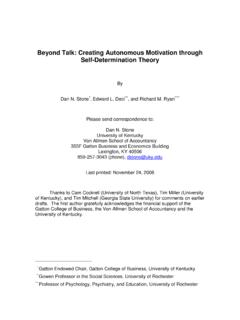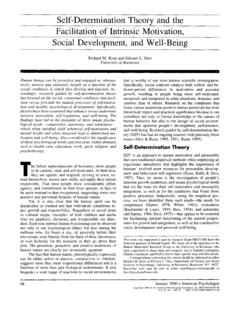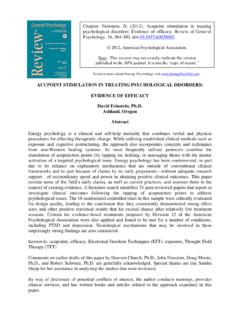Transcription of A Self-Determination Theory Approach to Psychotherapy: …
1 Canadian Psychology Copyright 2008 by the Canadian Psychological Association 2008, Vol. 49, No. 3, 186 193 0708-5591/08/$ DOI: A Self-Determination Theory Approach to psychotherapy : The motivational Basis for Effective Change Richard M. Ryan and Edward L. Deci University of Rochester The application of Self-Determination Theory (SDT) to psychotherapy is particularly relevant because a central task of therapy is to support the client to autonomously explore, identify, initiate, and sustain a process of change. In this article, the authors discuss the experimental work, field studies, and clinical trials representing the application of SDT to the domain of psychotherapy .
2 Evidence supports the importance of client autonomy for the attainment and maintenance of treatment outcomes. In addition, intervention studies suggest that therapist autonomy support enhances the likelihood that treatment gains will be achieved and maintained. The authors discuss some of the processes involved in enhancing autonomy, including the role of awareness, the importance of exploring and challenging introjects and external regulations, attention to need-related goal contents, and therapist attitudes required for a therapy Approach that is process- rather than outcome-focused.
3 Keywords: psychotherapy , Self-Determination Theory , motivation, autonomy In the past two decades, clinical psychologists have placed clinical encounters, treatment is an unfolding process, the goals of increasing emphasis on evidence-based treatment approaches which are sometimes changing. Comprehensive theories are within training programs and clinical practice (Kazdin, 2003). This needed to guide this process of working with clients so clinicians trend has been attributable both to (1) a sense of professionalism can identify what is needed even in novel circumstances as they within the field that has highlighted the importance of using engage in the tasks of therapy and facilitate maintenance of the techniques that have empirical backing, and (2) pressure from changes that result.
4 Third-party payers who want indication that treatment will impact In this article, we present an overview of an Approach to psy- important outcomes if they are to pay for it (Parry, 2000). chotherapy and behavior change derived from Self-Determination In clinical psychology this emphasis on evidence-based treatments Theory (SDT; Deci & Ryan, 2000; Ryan & Deci, 2000). SDT. has resulted in attention being paid to compiling specific, often provides empirically informed guidelines and principles for moti- manualized, methods designed to change targeted behavioral out- vating people to explore experiences and events, and from that comes.
5 In contrast, less attention has focused on the development and reflective basis, to make adaptive changes in goals, behaviors, and validation of comprehensive evidence-based theories that focus on the relationships. Because the issues of motivation and of creating a processes of change while also integrating varied factors that impact climate conducive to volitional and lasting change are central to all important outcomes and specifying how particular treatment tools can psychotherapies, the principles of SDT are not only useful in be optimally applied. Basing therapy in a comprehensive, evidence- informing therapeutic content but also have relevance across var- based Theory is especially important because clinicians are so often ied interventions and techniques.
6 Moreover, given the empirical presented with new situations and unique configurations of problems framework of SDT, both the effectiveness of these principles and to which highly standardized methods may not be readily applicable. their generalizability to different populations and therapeutic foci In fact, evidenced-based treatments typically are criterion-focused and are subject to ongoing empirical test and refinement. thus often developed on unrepresentative samples with discrete diag- SDT represents a broad Theory of motivated behavior, built upon nostic presentations (Westen, Novotny, & Thompson-Brenner, 2004).
7 Experimentally tested constructs and principles at both micro and By contrast, the focus of treatment in most therapy settings is complex macro levels (Deci & Ryan, 2008). Much basic research stemming and the course of therapy is not so easily preordained (Yalom, 2002). from SDT examines experimentally how the processes and struc- Accordingly, therapists require principles that can be adapted to such tures of rewards, directives, feedback, praise, positive regard, and circumstances. other change-related factors enhance or diminish self-motivation Indeed, with few exceptions, psychotherapy depends upon the and outcomes.
8 Moreover, as illustrated in other articles in this ongoing willingness of clients to recognize and work on specific, issue, SDT has been applied and tested in a variety of domains and and often multiple, problem areas in their lives. Thus, in most field settings. Herein we discuss the SDT model of psychotherapy and behavior change, and those aspects of it that have been empirically supported to date. Richard M. Ryan and Edward L. Deci, Clinical and Social Sciences in Psychology, University of Rochester, Rochester, New York. Perceived Locus of Causality and Therapy Success Correspondence concerning this article should be addressed to Richard M.
9 Ryan, Clinical and Social Sciences in Psychology, University of Rochester, Within SDT, the construct of autonomy concerns the self- 355 Meliora Hall, Rochester, NY 14627. E-mail: endorsement of one's behavior and the accompanying sense of 186. SPECIAL ISSUE: A Self-Determination Theory Approach TO psychotherapy 187. volition or willingness. SDT proposes that, when individuals are Research by Williams, Grow, Freedman, Ryan, and Deci (1996). more autonomously engaged in the therapeutic process that is, found that morbidly obese patients in a weight-loss program who when they have a more internal perceived locus of causality for reported more autonomous reasons for participating in treatment treatment (de Charms, 1968; Ryan & Connell, 1989) they will be lost more weight and were better able to maintain the weight loss more likely to integrate learning and behavior change, resulting in over a 2-year period than patients whose regulation was more more positive outcomes.
10 This is so because, to the extent that controlled. Here again, autonomy was associated with better at- people experience treatment or change as a function of external tendance and internalization of the treatment Approach , which was factors, they will experience conflict and division in the process of reflected in the sustained lifestyle changes made by these patients. change, rendering it unstable. Unless the client internalizes respon- In some cases therapy is prompted, or even mandated, by an sibility for the process of change, there can be little hope for external source, and in such cases the client is more prone to begin long-term success.

















